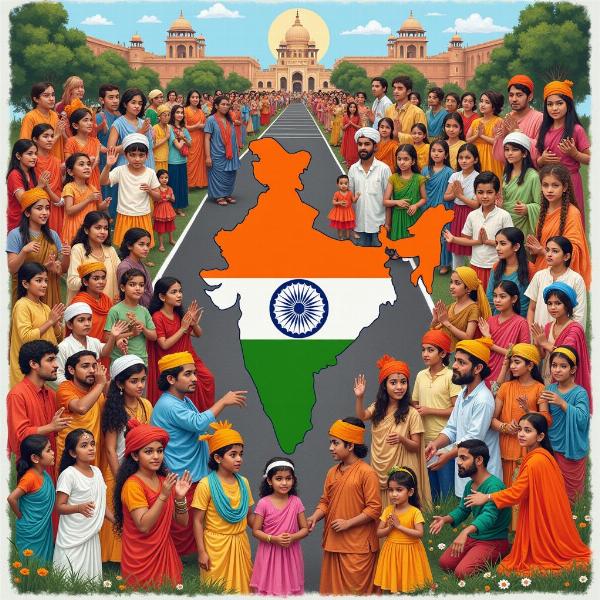Unification meaning in Hindi revolves around the concept of “ekikaran” (एकीकरण). This powerful word encapsulates the essence of bringing together disparate elements into a cohesive whole. Whether it’s the unification of diverse cultures, the merging of companies, or the integration of different parts of a system, understanding the nuances of “ekikaran” and its related terms is crucial for anyone seeking to grasp the meaning of unification in a Hindi context. This article will delve deep into the various aspects of unification, exploring its linguistic roots, cultural significance, and practical applications in different fields.
Exploring the Different Facets of “Ekikaran” (एकीकरण)
The word “ekikaran” itself stems from “ek” (एक), meaning “one,” highlighting the core principle of unity underlying the concept of unification. However, the meaning of unification can vary slightly depending on the specific context. For instance, political unification might refer to the merging of different states or territories under a single government, while social unification could denote the integration of various communities or groups. Let’s explore some key aspects:
- Political Unification (राजनीतिक एकीकरण): This refers to the process of uniting different political entities, often involving complex negotiations, treaties, and sometimes even conflict. A prime example is the integration of princely states into India after independence.
- Social Unification (सामाजिक एकीकरण): This involves bringing together diverse social groups, fostering harmony and understanding, and overcoming social barriers like caste, religion, or ethnicity.
- Economic Unification (आर्थिक एकीकरण): This aspect focuses on integrating economies through measures like free trade agreements, common currencies, and shared economic policies. The European Union serves as a relevant example.
- Cultural Unification (सांस्कृतिक एकीकरण): This refers to the blending or harmonizing of different cultures, often involving the sharing of traditions, values, and artistic expressions. While celebrating diversity, cultural unification seeks common ground and mutual respect.
Unification in Hindi Literature and Culture
Hindi literature is rich with examples of unification themes, often exploring the complexities and challenges involved in bringing together opposing forces. From epic poems like the Ramayana and Mahabharata, which highlight the importance of unity in the face of adversity, to modern literature that tackles social and political divisions, the concept of “ekikaran” is deeply ingrained in the Indian cultural fabric.
- The Concept of “Unity in Diversity” (विविधता में एकता): This core principle of Indian philosophy emphasizes the harmony that can arise from the coexistence of different cultures, languages, and beliefs. It celebrates the richness that diversity brings while recognizing the underlying unity that binds all together.
- Religious and Spiritual Unification: Many spiritual traditions in India, including Hinduism, Buddhism, and Sikhism, emphasize the importance of unifying the individual self with the universal consciousness. This spiritual quest for oneness is a central theme in various religious texts and practices.
 Unity in Diversity in India
Unity in Diversity in India
How to Say “Unification” in Different Hindi Contexts
While “ekikaran” is the most common term, other words and phrases can also convey the meaning of unification depending on the specific situation:
- मेल-मिलाप (mel-milaap): This term emphasizes reconciliation and bringing together people who were previously estranged.
- एकता (ekta): This simply means “unity” and can be used in broader contexts than “ekikaran”.
- संगठन (sangathan): This word refers to organization and can imply unification in the context of forming a structured group or entity.
Conclusion: The Power of “Ekikaran”
Unification, or “ekikaran” in Hindi, is a multifaceted concept with profound implications in various spheres of life. From political and economic integration to social and cultural harmony, the pursuit of unity remains a central theme in India’s history and cultural narrative. Understanding the nuances of “ekikaran” and its related terms provides valuable insight into the Indian worldview and its emphasis on the power of togetherness.
FAQ:
- What is the most common Hindi word for unification? The most common Hindi word for unification is “ekikaran” (एकीकरण).
- What is the difference between “ekikaran” and “ekta”? While both relate to unity, “ekikaran” specifically refers to the process of bringing things together, while “ekta” simply means “unity.”
- How does Indian culture view unification? Indian culture values “unity in diversity,” celebrating the coexistence of different cultures and beliefs while recognizing the underlying unity that binds them.
- Can you give an example of political unification in India? The integration of princely states into India after independence is a prime example of political unification.
- What are some other Hindi words related to unification? Other words include “mel-milaap” (reconciliation) and “sangathan” (organization).
About Meaning-Hindi.in
Meaning-Hindi.in is your one-stop solution for all your Hindi translation needs. We offer a wide range of professional translation services, from business and legal documents to technical manuals and website localization. Our team of expert Hindi linguists ensures accurate and culturally sensitive translations, catering to diverse industries and clients. Whether you need help with commercial translations, legal document translation, or educational material, Meaning-Hindi.in has the expertise to deliver high-quality results. Contact us today for a free quote! Email: [email protected], Phone: +91 11-4502-7584.